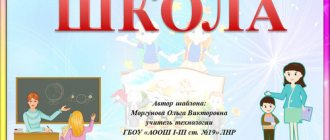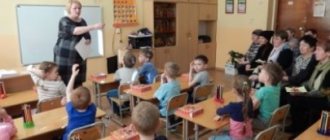Objectives, goals, principles of the Federal State Educational Standard for Education
The goals of the new Federal State Educational Standard in preschool educational institutions:
1) increasing the social status of preschool education; 2) ensuring by the state equal opportunities for every child to receive quality preschool education; 3) ensuring state guarantees of the level and quality of preschool education based on the unity of mandatory requirements for the conditions for the implementation of educational programs of preschool education, their structure and the results of their development; 4) maintaining the unity of the educational space of the Russian Federation regarding the level of preschool education.
Objectives of the new Federal State Educational Standards in preschool educational institutions:
1) protecting and strengthening the physical and mental health of children, including their emotional well-being;
2) ensuring equal opportunities for the full development of every child during preschool childhood, regardless of place of residence, gender, nation, language, social status, psychophysiological and other characteristics (including disabilities);
3) ensuring the continuity of the goals, objectives and content of education implemented within the framework of educational programs at various levels (hereinafter referred to as the continuity of the main educational programs of preschool and primary general education);
4) creating favorable conditions for the development of children in accordance with their age and individual characteristics and inclinations, developing the abilities and creative potential of each child as a subject of relationships with himself, other children, adults and the world;
5) combining training and education into a holistic educational process based on spiritual, moral and sociocultural values and rules and norms of behavior accepted in society in the interests of the individual, family, and society;
6) the formation of a general culture of the personality of children, including the values of a healthy lifestyle, the development of their social, moral, aesthetic, intellectual, physical qualities, initiative, independence and responsibility of the child, the formation of prerequisites for educational activities;
7) ensuring variability and diversity in the content of Programs and organizational forms of preschool education, the possibility of creating Programs of various directions, taking into account the educational needs, abilities and health status of children;
 formation of a sociocultural environment that corresponds to the age, individual, psychological and physiological characteristics of children;
formation of a sociocultural environment that corresponds to the age, individual, psychological and physiological characteristics of children;
9) providing psychological and pedagogical support to the family and increasing the competence of parents (legal representatives) in matters of development and education, protection and promotion of children’s health.
Principles of the Federal State Educational Standard in preschool educational institutions:
1) full-fledged experience by the child of all stages of childhood (infancy, early and preschool age), enrichment (amplification) of child development; 2) building educational activities based on the individual characteristics of each child, in which the child himself becomes active in choosing the content of his education, becomes a subject of education (hereinafter referred to as individualization of preschool education); 3) assistance and cooperation of children and adults, recognition of the child as a full participant (subject) of educational relations; 4) supporting children’s initiative in various activities; 5) cooperation of the Organization with the family; 6) introducing children to sociocultural norms, traditions of the family, society and state; 7) formation of cognitive interests and cognitive actions of the child in various types of activities; age adequacy of preschool education (compliance of conditions, requirements, methods with age and developmental characteristics);
2) building educational activities based on the individual characteristics of each child, in which the child himself becomes active in choosing the content of his education, becomes a subject of education (hereinafter referred to as individualization of preschool education); 3) assistance and cooperation of children and adults, recognition of the child as a full participant (subject) of educational relations; 4) supporting children’s initiative in various activities; 5) cooperation of the Organization with the family; 6) introducing children to sociocultural norms, traditions of the family, society and state; 7) formation of cognitive interests and cognitive actions of the child in various types of activities; age adequacy of preschool education (compliance of conditions, requirements, methods with age and developmental characteristics);
9) taking into account the ethnocultural situation of children's development.
The main goal of the preschool educational institution is to enrich the development of children
The task of the kindergarten is not to provide information in large quantities. Children will have time to die under its shaft. On the one hand, I’m kidding. On the other hand, I’ve come across many articles about ways to protect the brain from an overabundance of data. These methods have been relevant in the last decade, when information literally “jumps out” from all sides. For example, parents often blame their children for not reacting quickly to treatment and other stimuli. This is precisely one of the ways the brain protects itself.
So, the task of preschool education is not to overwhelm the child with new things, but to enrich his development. It is important to strike a balance here so that:
- childhood was preserved and brought joy;
- educational information was presented in a relaxed manner;
- the process was not monotonous;
- children and teachers enjoyed it;
- the physical and psychological health of preschool children was preserved and strengthened.
We consider the role of kindergarten in the Russian education system. What is “education” anyway? It has at least three aspects:
- Transferring socially significant human experience. It is embodied in knowledge and skills, creativity, values in relation to the world and society.
- A continuous chain of education, the links of which are different educational institutions (public and private, municipal, etc.).
- The process and result of learning. The outcomes are expected to be knowledge, skills and abilities. As well as the ability to make decisions in different situations based on acquired knowledge.
The first level of education is preschool. It can be received in preschool or under the guidance of parents. It is ideal if there is a full-fledged family and a kindergarten at the same time. In the family, the baby learns interpersonal relationships, gains a sense of security, learns to relax and trust. And the garden supports parents: it provides care and concern for the child while they work.
In addition to supporting parents, kindergarten can give a lot. Namely, it offers a children's society that will provide invaluable social experience. The child gets to know himself by comparing with others, trying out options for interaction.
Upbringing and education in a preschool institution
Education, understood in a broad sense, means socialization. This is a social function of society, which consists in preparing the younger generation for future life, merging with society and bringing benefits to it.
In the narrow sense that is used in the context of pedagogical science, education is a specially organized, controlled process aimed at developing a child as an individual, carried out by educators and teachers in children's educational institutions of various levels. The goal of education and training is to obtain pronounced changes for the better that occur in a child and or a group of children under the influence of special methods, systems and developments used by educators and teachers.
Thus, based on the above formulations, the main task of a kindergarten teacher is to obtain a comprehensively developed, free, creative and harmonious personality. This is achieved by solving many different problems.
Types of problems in mathematics in preschool educational institutions
In preschool institutions, children learn to solve problems in one action. They are divided into three groups:
The first group includes tasks during the solution of which the meanings of arithmetic operations are studied.
The second group includes those based on understanding the relationships between the parts and the result of calculations.
Types of tasks to search for unknown parts:
- find the first term;
- find the second term;
- find minuend;
- find the subtrahend;
The third group consists of simple problems based on determining the difference in ratios:
- increase the number by several units;
- reduce the number by a few units;
Similarly, tasks are divided into two more types: dramatization tasks and illustration tasks. The type of tasks is determined based on the visual material used. Each type has its own distinctive characteristics, they help develop the ability to select life and game material for the plot, and to think logically.
The plot of the dramatization task contains the lives of the children themselves, what they are doing or have just done. In this type of task, their meaning is clearly presented. Thanks to solving such problems, children begin to realize that they always reflect the real lives of people.
When solving a dramatization problem, it is important to teach children to notice the variety of connections and quantitative relationships.
Note! It is very important to solve such tasks at the initial stage of training. Because children try to come up with problems about themselves, as well as describe each other’s activities and learn to formulate a question.
Illustration tasks are an important type of task in the system of visual aids. A wide variety of scenarios are created with the help of toys. They help to fantasize, train memory, teach children to come up with problems and thereby lead them to composing and solving oral problems.
Didactic games for older children
Visual materials are often used to illustrate problems. Lightness of plot, dynamic content and obvious quantitative relationships between objects are the main requirements for the material.
Visual material for counting
The teacher can easily create a picture task on his own. Visual aids make it easier to understand the meaning of arithmetic tasks and their structure.
Speech development
According to the Federal State Educational Standard, educational areas include:
- development of speech proficiency;
- vocabulary enrichment;
- acquaintance with literature;
- development of sound culture of speech.
Formation of sound culture of speech
In preschool children, the pronunciation of sounds is formed gradually. The task of teachers is to promptly detect incorrect pronunciation of individual sounds and take measures to eliminate defects.
This is an important point in the educational process, since problems with auditory speech negatively affect educational activities, as well as the social adaptation of the child.
Formation of a dictionary
Children's vocabulary increases as they age. The task of both teachers and parents is to actively contribute to this process. Fiction and didactic games provide assistance.
Formation of grammatical structure of speech
The tasks of this area of development in preschool educational institutions according to the Federal State Educational Standard include helping children master the morphological form of the language, mastering syntactic rules, and the correct agreement of words in a sentence.
Development of coherent speech
Coherent speech refers to the child’s ability to clearly and coherently express his thoughts. The main task of teachers is to form a culture of speech, skills and abilities, and grammatical structure. Development of speech creativity
Important! Speech creativity refers to a new technique based on combining creative abilities with the development of speech skills. Most often, classes are conducted in a playful way, in the production of skits.
Classes on traffic rules in preparatory groups of kindergartens
Introduction to fiction
In kindergarten, special attention is paid to reading books from an early age. The program of familiarization with literature is structured depending on age characteristics. The work must be carried out comprehensively. Children should be exposed to books not only in kindergarten, but also at home. To do this, educators select relevant literature and recommend it to parents for reading at home.
Reading literature
Results
The system of modern preschool education in Russia still needs reform. Her problems are closely related to the problems of society. Strategic goals will help solve them, the implementation of which determines the prospects for the development of preschool education in Russia:
- implementation of educational programs that meet modern requirements;
- education must be democratic;
- training of qualified personnel with a specialization in “Preschool education”;
- ensuring labor efficiency on a contract basis;
- reform in the structure of education authorities, etc.
Only such positive changes can bring significant transformations to preschool education in Russia.




